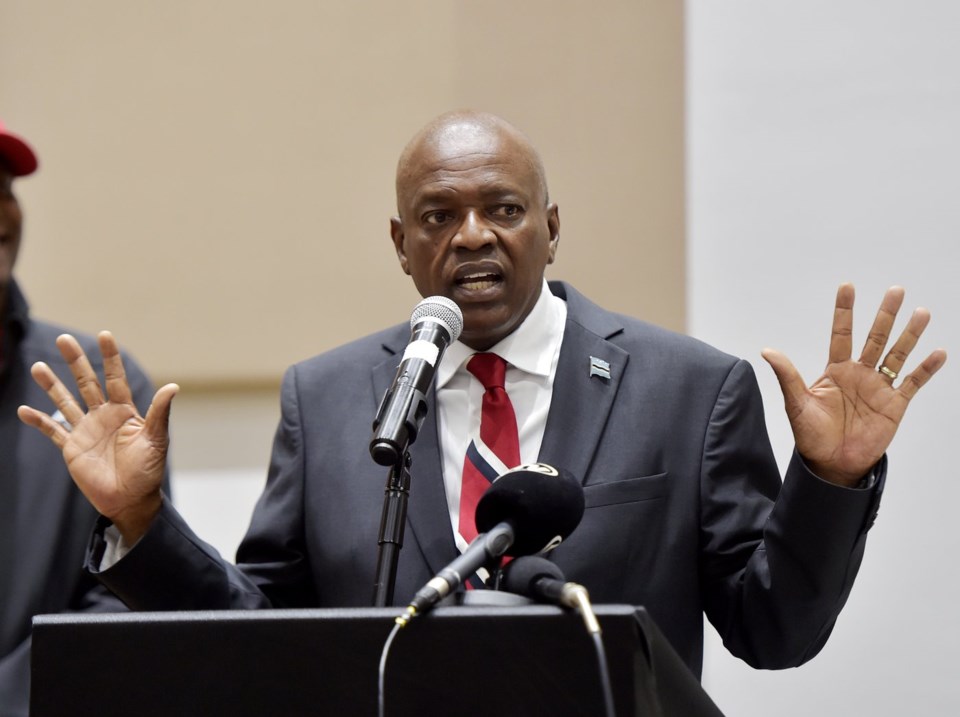GABORONE, Botswana (AP) — The party of Botswana's opposition candidate Duma Boko was declared the election winner Friday over incumbent President Mokgweetsi Masisi in a seismic change that ended the ruling party’s 58 years in power since independence from Britain.
Masisi conceded defeat even before final results were announced, with his Botswana Democratic Party trailing in fourth place in the parliamentary elections in what appeared to be a humbling rejection by voters and a landslide victory for the main opposition party.
Hours later, Chief Justice Terence Rannowane announced that the opposition Umbrella for Democratic Change party had won a majority of seats in the election, making its candidate, Boko, the next president of the southern African country, which is
Masisi said he had called Boko to inform him he was conceding defeat.
The final results of the election were yet to be formally declared, but Rannowane said the UDC had reached the 31-seat threshold to win a majority.
“I concede the election," Masisi said in an early-morning press conference two days after the vote. "I am proud of our democratic processes. Although I wanted a second term, I will respectfully step aside and participate in a smooth transition process.”
“I look forward to attending the coming inauguration and cheering on my successor. He will enjoy my support.”
Masisi's BDP dominated politics in Botswana for nearly six decades, since independence in 1966. The nation of just 2.5 million people will now be governed by another party for the first time in its democratic history.
“We lost this election massively,” said Masisi, a 63-year-old former high school teacher and UNICEF employee. “I have not packed a shoe. I did not expect it,” he added.
Boko is a 54-year-old lawyer and Harvard Law School graduate who also ran in 2014 and 2019. He didn't immediately comment but posted on his official page on X: “Botswana First” with a picture of a UDC campaign poster with the words “Change is Here.”
Botswana has been held up as one of Africa's most stable democracies and is regarded as a post-colonial success story having built one of the highest standards of living in the region through an economy that largely relies on diamonds. Botswana is the world's second biggest natural diamond producer behind Russia and has been responsible for all the
But Botswana faces new challenges and the mood for change became evident as a downturn in the global demand for diamonds badly impacted the economy, becoming the central issue for the campaign.
Unemployment rose to more than 27% this year, and significantly higher for young people, as the government saw a sharp decrease in revenue from diamonds. Masisi and his party had faced criticism for not having done enough to diversify the economy and the nation has been forced to adopt recent austerity measures.
Even the BDP conceded throughout its campaign that policy change was needed and tried to convince voters it was capable of leading the country out of its economic troubles. Diamonds account for more than 80% of Botswana's exports and a quarter of its GDP, according to the World Bank.
Masisi said the country had hardly sold any diamonds since April through its Debswana company, which the government jointly owns with diamond miner De Beers.
Botswana's general elections decide the makeup of its Parliament, and lawmakers then choose the president. The party that gains a majority is in position to choose its candidate as president. All five of Botswana's post-independence presidents have been from the BDP.
The BDP was one of the longest-serving parties in Africa still in power and its sharp defeat came as a surprise after what was expected to be a tight race. It followed in neighboring South Africa, where the long-ruling African National Congress lost its 30-year majority in an election in May and was forced to share power for the first time in a coalition government.
___
This story has been updated to correct the spelling of President Mokgweetsi Masisi's first name.
___
AP Africa news:
Sello Motseta, The Associated Press


